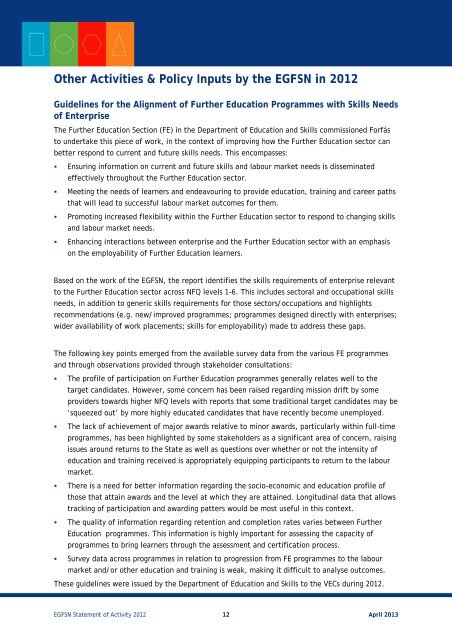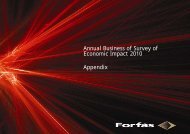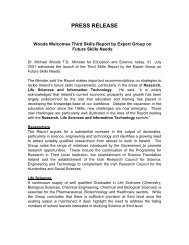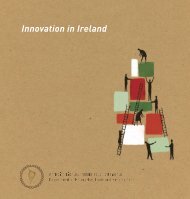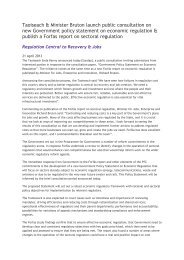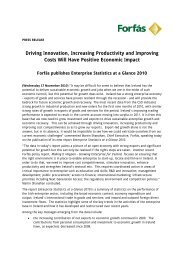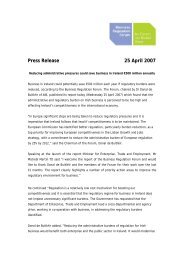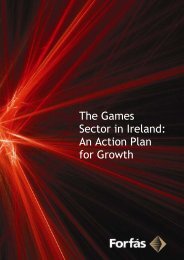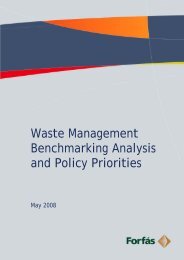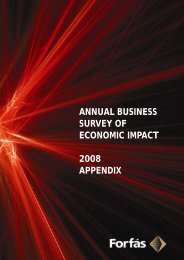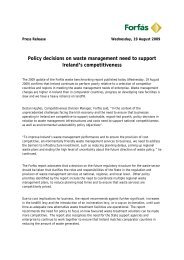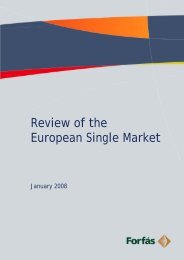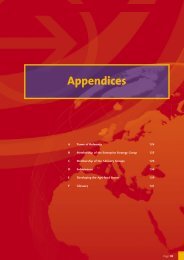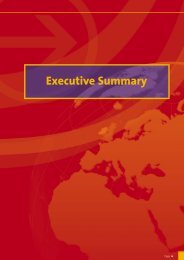EGFSN Statement of Activity (PDF, 29 pages , 416KB) - Skills Ireland
EGFSN Statement of Activity (PDF, 29 pages , 416KB) - Skills Ireland
EGFSN Statement of Activity (PDF, 29 pages , 416KB) - Skills Ireland
Create successful ePaper yourself
Turn your PDF publications into a flip-book with our unique Google optimized e-Paper software.
Other Activities & Policy Inputs by the <strong>EGFSN</strong> in 2012<br />
Guidelines for the Alignment <strong>of</strong> Further Education Programmes with <strong>Skills</strong> Needs<br />
<strong>of</strong> Enterprise<br />
The Further Education Section (FE) in the Department <strong>of</strong> Education and <strong>Skills</strong> commissioned Forfás<br />
to undertake this piece <strong>of</strong> work, in the context <strong>of</strong> improving how the Further Education sector can<br />
better respond to current and future skills needs. This encompasses:<br />
Ensuring information on current and future skills and labour market needs is disseminated<br />
effectively throughout the Further Education sector.<br />
Meeting the needs <strong>of</strong> learners and endeavouring to provide education, training and career paths<br />
that will lead to successful labour market outcomes for them.<br />
Promoting increased flexibility within the Further Education sector to respond to changing skills<br />
and labour market needs.<br />
Enhancing interactions between enterprise and the Further Education sector with an emphasis<br />
on the employability <strong>of</strong> Further Education learners.<br />
Based on the work <strong>of</strong> the <strong>EGFSN</strong>, the report identifies the skills requirements <strong>of</strong> enterprise relevant<br />
to the Further Education sector across NFQ levels 1-6. This includes sectoral and occupational skills<br />
needs, in addition to generic skills requirements for those sectors/occupations and highlights<br />
recommendations (e.g. new/improved programmes; programmes designed directly with enterprises;<br />
wider availability <strong>of</strong> work placements; skills for employability) made to address these gaps.<br />
The following key points emerged from the available survey data from the various FE programmes<br />
and through observations provided through stakeholder consultations:<br />
The pr<strong>of</strong>ile <strong>of</strong> participation on Further Education programmes generally relates well to the<br />
target candidates. However, some concern has been raised regarding mission drift by some<br />
providers towards higher NFQ levels with reports that some traditional target candidates may be<br />
‘squeezed out’ by more highly educated candidates that have recently become unemployed.<br />
The lack <strong>of</strong> achievement <strong>of</strong> major awards relative to minor awards, particularly within full-time<br />
programmes, has been highlighted by some stakeholders as a significant area <strong>of</strong> concern, raising<br />
issues around returns to the State as well as questions over whether or not the intensity <strong>of</strong><br />
education and training received is appropriately equipping participants to return to the labour<br />
market.<br />
There is a need for better information regarding the socio-economic and education pr<strong>of</strong>ile <strong>of</strong><br />
those that attain awards and the level at which they are attained. Longitudinal data that allows<br />
tracking <strong>of</strong> participation and awarding patters would be most useful in this context.<br />
The quality <strong>of</strong> information regarding retention and completion rates varies between Further<br />
Education programmes. This information is highly important for assessing the capacity <strong>of</strong><br />
programmes to bring learners through the assessment and certification process.<br />
Survey data across programmes in relation to progression from FE programmes to the labour<br />
market and/or other education and training is weak, making it difficult to analyse outcomes.<br />
These guidelines were issued by the Department <strong>of</strong> Education and <strong>Skills</strong> to the VECs during 2012.<br />
<strong>EGFSN</strong> <strong>Statement</strong> <strong>of</strong> <strong>Activity</strong> 2012 12 April 2013


